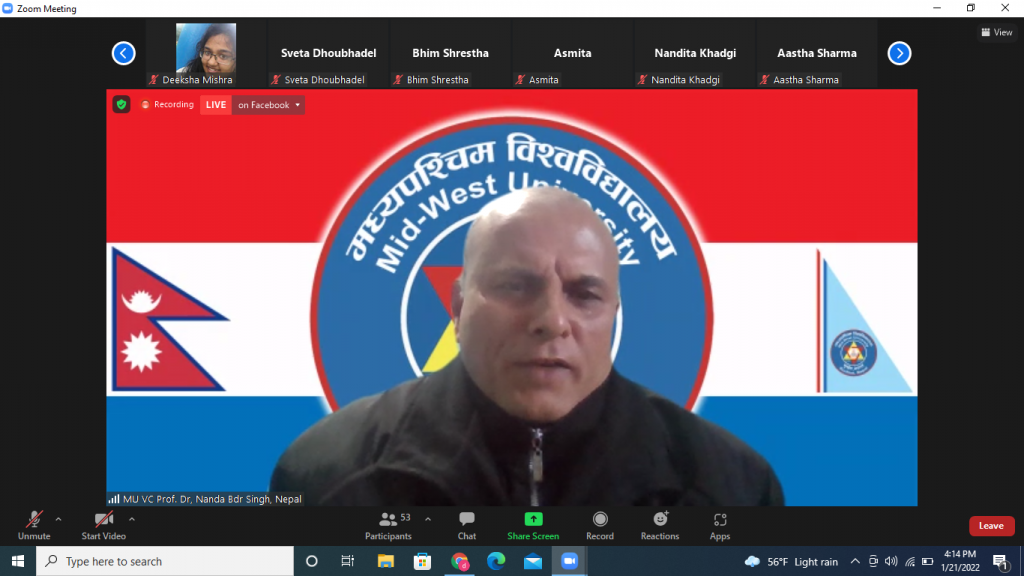Cooperation and Development (MICD) under the Mid-Western University (MWU) on 4 May 2020. The
event was graced by the newly appointed Vice-Chancellor of MWU, Professor Dr Nanda Bahadur Singh.
There were more than 90 attendees including academicians, MWU officials, faculty members, experts,
practitioners, and graduate students. Taking interest at the time of pandemic, the participants
represented four continents: Africa, North America, Asia and Europe of the world. The virtual seminar had
three invited speakers sharing their views on the topic followed by a question and answer session. ]]>
It is a great pleasure to have completed the ‘Trade and Finance for Development’ course (MICD 513) today. Delivering discussions on ‘International Trade and its relationship with Economic Growth and Development’ is a tough task particularly to the group of students coming from diverse academic background, some of whom had never studied Economics and Business Management. The second component of this course ‘Finance for Development’ was equally a challenging task, to deliver the concepts and to illustrate data and arguments to explain the evolution and expansion of different types of public and private international and domestic sources of finance for development.
]]>Prospects of New Opportunities was the topic of the first scholastic talk. Academician Mr. Dipak Gyawali was an invited speaker at the event. Professor Dr. Nanda Bahadur Singh, Vice-Chancellor of MU, officially inaugurated the talk series and delivered his
remarks at the start of the program.
A Report
Summary
A webinar on “Returning Home in COVID-19 Pandemic: Labor Market and Employment” was organized by Master in International Cooperation and Development (MICD) under Mid-Western University (MWU) on 15 June 2020. This was the fourth virtual panel discussion of the MICD-MWU webinar series in COVID-19 pandemic. The event was marked by the special presence of Prof. Dr. Nanda Bahadur Singh, Vice-Chancellor of MWU. There were more than 50 attendees including academicians, faculty members, experts, practitioners and graduate students. The invited two distinguished experts- Mr. Yuba Raj Bhusal, former Secretary of Government of Nepal and Dr. Padma Prasad Khatiwada, Associate Professor, Population and Migration Study, Tribhuvan University, shared their ideas, knowledge and experiences in various aspects of labor market and employment in the midst of the pandemic and responded to the queries of the participants.
In the beginning, the facilitator Dr. Dinesh R. Bhuju, Hon. Professor and Academic Head of MICD-MWU, welcomed the guests, invited experts, and other participants and thanked them for allocating their precious time to grace the program. Discussing the increasing cases of COVID-19 in the globe and Nepal, Dr. Bhuju said that the pandemic has an effect on all three domains of sustainable development- economic, environmental and social. The academic head of MICD-MWU discussed Nepali migrant workers especially based in India and Gulf countries are increasingly returning back home due to job loss and health crisis caused by the epidemic in the host country. What is the future of returnees back home? What is the state of job security in Nepal? What are the direct and indirect socio-economic consequences of increasing reverse migration in Nepal? Dr. Bhuju believed that this webinar will dig out the concrete answers to these questions.
Delivering his welcome remarks, Prof. Dr. Nanda B. Singh presented the statistics of economic growth and unemployment across the globe showing how the pandemic has negative effect on them. He said the number of Nepali coming back home from India, Middle East and Europe is increasing day by day because of job loss and unemployment. Furthermore, he speculated the reverse migration, if not managed properly, might trigger violence, insecurity and instability in the society. In this context, he recommended the actions to be initiated by federal, provincial and municipal government in order to employ the returnees in the homeland that include:
- Increase agriculture activities focusing on mass production
- Activate the financial institutions considering the protocols of social distancing
- Recuperate the supply chain system
- Initiate three shift works in construction and hydropower or energy sector
- Employ returnees in home area based on their skills
The first key note speaker, Dr. Padma Prasad Khatiwada said there are two emerging issues that need urgent actions i.e. how to retain the employment and how to create the new employment as youths are returning home in the era of pandemic. He elaborated the migrant workers, especially from India, has been facing inhuman treatment in their route to the home. Discussing the pathetic situation of the quarantine center, Dr. Khatiwada mentioned that the society perceived the returnees as the vector of COVID-19 that may ruin the psychological health of the returnees. Out of 4 million Nepali working in India, around 700, 000 have already been back to Nepal. The number will go up by 500,000 in next five months. Similarly, he said around 250,000 people have already come back from gulf countries. Dr. Khatiwada discussed some of Nepali students pursuing higher education in abroad universities are also facing the problems. Discussing the challenges of employment and social integration of the returnees, Dr. Khatiwada suggested measures to address the socio-economic impact of the pandemic are:
- Devise specific guidelines and policies to implement government plan of employing 800,000 youths as provisioned in the 2020/21 budget
- Attract returnees and youths in the agricultural sector as well as other entrepreneurial activities
- Promote social entrepreneurship as well as collective farming
- Develop proper guidelines and policies to implement the concept of food bank and land bank as provisioned in the 2020/21 budget
- Provide soft loan to initiate the business and the enterprises
- Initiate holistic disaster management plans
- Ensure transparent and accountable governance
- Bring special packages to the women and vulnerable groups
- Create favorable environment to enroll young students in the universities across Nepal during the pandemic
- Provide cash grants instead of relief packages
- Instigate the strong monitoring mechanism and system
Stating the regulations, policies and plans of Nepal relating to employment and labor market, Mr. Yuba Raj Bhusal, the second speaker of the event, said that remittances have 1/3rd contributions to the GDP of Nepal. The former secretary of Nepal listed the issues and problems of labor market and employment are unskilled labor, lack of information system, recruitment fraud, wage theft, human trafficking and dominant informal employment sector. He briefed the impact of COVID-19 in Nepalese economy are reduced economic growth, diminished the remittance flow and increased unemployment and job loss. Pointing the government weakness in handling the COVID-19 crisis, Mr. Bhusal identified the challenges and opportunities of COVID-19 in the socio-economic aspect of Nepal are as following:
Challenges
- Difficulty in family re-integration and reunion
- Massive discontent against the lockdown and its impact on economy
- Inefficiency and incompetency of three tiers of government in handling the COVID-19 crisis
- Anxiety in the bridging the fiscal gaps due to the remittances
- Corruption during the pandemic
- Lack of technical knowhow, financial constraint, as well as poor health services and facilities in provincial and local level.
Opportunities
- Regain the importance of Agriculture sector and small and medium sized enterprises
- Planning the financial and social remittances according to the need of society
- Utilize the knowledge, skills and experience of the returnees
- Better manage the information system and data
- Materializing the concept of land bank
- Swift mechanizing the agriculture sector including establishing the cold stores
- Promoting labor diplomacy
- Identify other employment elasticity in job intensive sectors
- Coordination and cooperation among different layers of government
- Establish labor academy for research and training
- Best use of youth-self employment fund and poverty alleviation fund
The common message of the Vice-Chancellor and two distinguished speakers was that the COVID-19 has provided the opportunity of becoming self-reliant Nepal. In the final session, Dr. Khatiwada and Mr. Bhusal responded the queries of the participants. The virtual seminar was officially closed with the vote of thanks from Mr. Rabin Malla, Program Coordinator of MICD-MWU.
Report prepared by Dayaraj Subedi, MICD-MWU
]]>
